Obituary
Trailblazing Maine lawmaker Lois Galgay Reckitt dies at 78
State representative co-founded HRC Fund, fought for domestic violence survivors
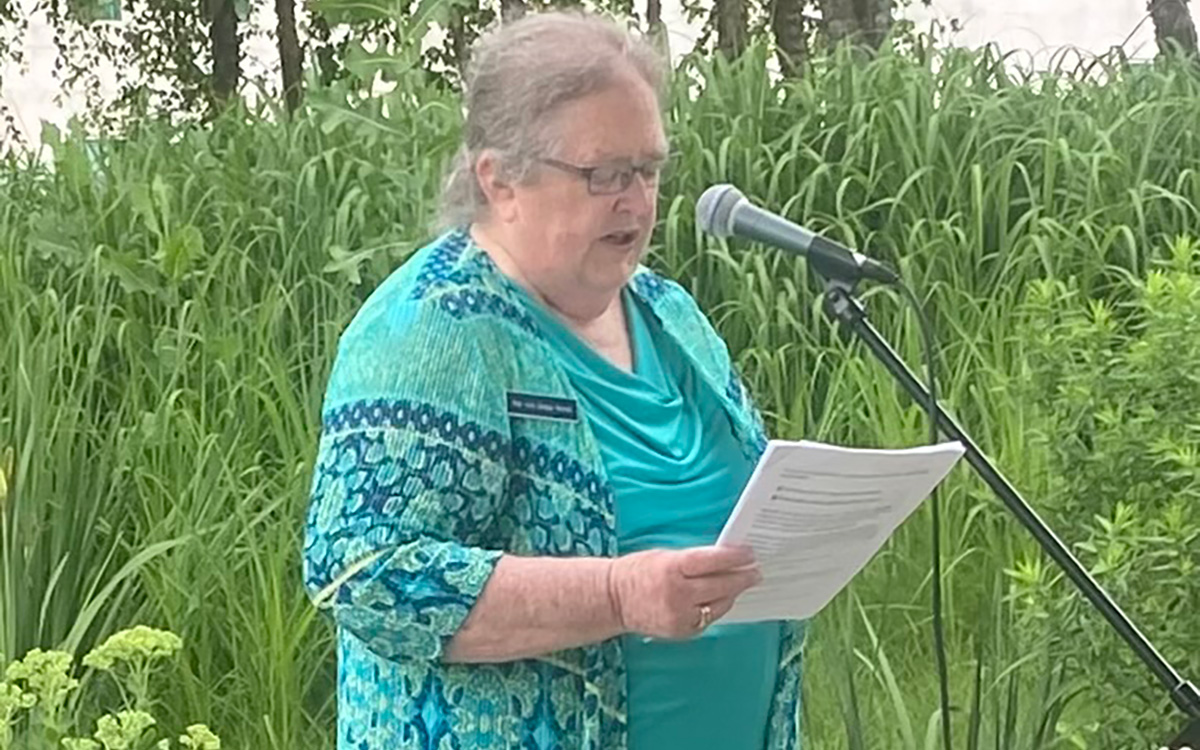
After spending many happy summers at Goose Rocks Beach in Maine, Lois Galgay told her mother when she was 7 that she wanted to move to Maine. Her mother suggested she wait until she grew up.
She waited, but she did end up in Maine in her 20s and became the fiercest advocate for woman and children the state has ever seen, her decades-long advocacy ending only with her death from cancer Oct. 30, 2023, at the age of 78. Maine recognized her achievements by inducting her into the Maine Women’s Hall of Fame and the Deborah Morton Society, and by giving her awards for her seminal work on domestic violence. The judicial system, the state bar association and the police chiefs’ association all honored her.
But she also was a leader on the national stage. The headline in Ms. Magazine after her death read: “Rest in Power: Lois Galgay Reckitt, Trailblazing Feminist Activist.”
Eleanor Smeal, an activist since the 1970s who was once called one of the most influential women in America, wrote these words in the magazine: “Lois Reckitt has not only been an inspirational leader for women and girls in Maine, but also nationwide. Lois was a champion for the Equal Rights Amendment both for the United States Constitution and the Maine Constitution. She was a leader in the National Organization for Women and a national leader in the fight to end violence against women and girls. I had the good fortune to work with her closely when I was president of the National Organization for Women, and she was the executive vice president. She worked for women’s rights until the time of her death and was very proud that she had just passed historic legislation in Maine to end sex trafficking.”
Reckitt was on NOW’s national board for 15 years and from 1984 to 1988 was executive vice president. She was elected to the position, and pursued the work with a vengeance, working 60 to 70 hours a week. She also served for eight years on the national board of the Human Rights Campaign Fund, a political action group she cofounded and replicated in Maine. She was a member of the National Coalition to End Domestic Violence for many years.
She is listed in “Feminists Who changed America ’63-’75.”
Reckitt grew up in Massachusetts, an only child and the daughter of parents who both were polio survivors. She came to Maine by following her husband, who was stationed in the Coast Guard in South Portland. She said she had no clue she was a lesbian at that time. That truth came to her during two marriages, and in due time she came out and became a champion for gay rights.
She was preceded in death by her father, George A. Galway of Winthrop, Mass., and her mother, Marjorie Lewis Wright of South Portland.
She is survived by Lyn Kjenstad Carter, her loving partner/wife of 20 years; stepdaughter, Barbara M. Carter-Eide, son-in-law, Pala Carter-Eide, stepdaughter, Crystal L. Hartford; five grandchildren; and many cousins in the Galway and Wright families.
She was not only a national leader on domestic violence — she was a true leader in Maine. She founded Family Crisis Shelter, which became Family Crisis Services, now Through These Doors, and headed it for more than three decades, taking time out for her work in Washington, D.C. When she returned to Maine, she was exhausted and said she would do nothing but sleep for six months. But she resumed her work, heading an agency with a $1.4 million budget, a staff of 30, three outreach offices and a battered women’s shelter. At the forefront of efforts to stop domestic abuse and help its victims, she lobbied for stronger laws and more aggressive enforcement of them. She raised public awareness of the magnitude of domestic abuse while lobbying successfully for anti-stalking legislation, a domestic violence homicide review panel and gun control measures for abusers.
She worked not just to pass laws but to help police, prosecutors and judges better understand domestic violence and the harm it caused. “Her approach rested on her belief that people want to do what is right and just, and that most people will respond better to a victim’s needs if that person has knowledge of the dynamics of domestic violence,” said retired Judge Michael Cantara, a longtime friend.
Reckitt led many groups, but sometimes had to create them first. Maine’s NOW chapter, the Maine Right to Choose, the Maine Coalition for Human Rights and the Matlovich Society for Gay Rights and AIDS Awareness were among the organizations that were created, in whole or in part, by her. Forty-five years ago, she and eight others, including now-Gov. Janet Mills, founded the Maine Women’s Lobby. Destia Hohman Sprague, current Women’s Lobby executive director, said Reckitt “set such a profound example of what it is like to work on an issue, to follow your heart and to work on an issue in every possible way. She never gave up working as an activist and then a policy maker, and I just admire that so much.”
State leaders lauded her on her passing, calling her a trailblazer, a feminist icon, a hero, a modern pioneer and “a truly remarkable person.”
“Lois never stopped trying to make our state better for everyone,” said Mills, who went to her home to swear her in for her last legislative term. “She was a dear friend, and I will miss her deeply.”
Reckitt knew her work would take endurance, a requirement that may have tested her mettle, but she never gave up. She introduced an Equal Rights Amendment in the Maine Legislature three times and was rebuffed every time. She helped create the coalition that put forward the first gay rights bill in Maine. She and other activists thought it would take 10 years to pass a law. It took 25. She could find only two sponsors. One was Gerald Talbot, the first black man elected to the Maine Legislature. To learn more about gay rights, Talbot went a bookstore to get a book. “They wouldn’t take the money out of his hand because they thought he was gay,” Reckitt recalled. The incident showed the difficulty they were up against. Reckitt provided the lead testimony on the bill, but even though no one spoke against it, it failed.
She came out at this time, but minimally. She decided to stay closeted until the first campaign was over and came out afterwards at the farmhouse of a straight friend in Newcastle. Gay rights were in her playbook from that moment on. Working with a gay man who was dying of AIDS, she founded a group that provided a safe space for gays and lesbians to gather, a way of lessening their isolation. It began with six or seven people and soon mushroomed to be as many as 150, some driving hours to get there. She would be a pallbearer at the man’s funeral.
Despite the intensity of her work to fix things that were broken, she wasn’t a rabble rouser — she tended to work behind the scenes — but she was arrested twice, once while protesting apartheid at the South African embassy in Washington. She jumped into the national fray again when the national gay rights movement went to Washington to protest Reagan’s inadequate response to the AIDS crisis. In an oral history interview, she was clearly dismayed that Reagan had never spoken the word AIDS. “Reagan was such a ditz,” she said.
Outside the White House, she protested in the prosaic way it was done in those days: sitting down and refusing to move. Sixty-seven people were arrested. She was the first, “not because I was particularly outrageous or anything” but because of the way the protest was set up, she said in her oral history interview. She claimed to have “the odd distinction of being the first women in the U.S. arrested by police using those Playtex rubber gloves,” which they used to “reach down my pants to see if I was carrying who knows what.”
She had widespread interests, including her Irish ancestry. She knitted, quilted and did needlepoint, traveled extensively, taught swimming and biology, played basketball in college. Most importantly, she loved the Boston Red Sox and Celtics.
In seeming contradiction to her life’s work, she received college degrees from Brandeis University in biology and from Boston University in marine biology and biological oceanography. But she said her scientific education taught her how to approach things in life.
“She loved the sea, and she loved that she lived only steps from the beach,” said longtime friend Lee Umphrey. “She liked to say her legislative district was on the ocean side of South Portland.”
She once said the three loves of her life were the women’s rights movement, the lesbian rights movement and the movement to end violence women. “I have lived an interesting life,” she said.
“Lois came of age when the civil rights movement, the environmental protection movement, the anti-Vietnam movement, the anti-apartheid movement, and the equality for women movement were front and center,” said Cantara, the retired judge. “She chose to become a lifelong engaged citizen who advocated for the poor, the marginalized, the forgotten, the dismissed. She took her legislative duties very seriously. She was working on legislative matters up to two days before she died.”
She even participated in a national conference from her hospital bed, one that focused on her pioneering Maine work to end sexual exploitation. In appreciation, the National Center on Sexual Exploitation gave her the Dignity Defense Award. “To the very end, Lois was in the saddle championing equality,” Umphrey said. “She gave it her all until the end.”
But in her 1999 oral history interview, she wondered what her life would add up to. “One of the things I’ve been concerned about my life is to not have my life disappear,” she said. “I figure somebody will remember sometime that I set foot on the planet. I’ve done a lot of good stuff. I know that, and I figure I’m only half done.”
A celebration of her life took place on Nov. 12, at the Maine Irish Heritage Center in Portland. Reckitt had been on the center’s board and its treasurer.
In lieu of flowers, donations are suggested to:
Through These Doors at
737-234-6464; OR
The Maine Irish Heritage Center,
34 Gray St.,
Portland, Maine, 04112-7588
207-780-0118
Obituary
Nanette Kazaoka, an unlikely AIDS activist, dies at 83
Member of ACT-UP, longtime social justice advocate
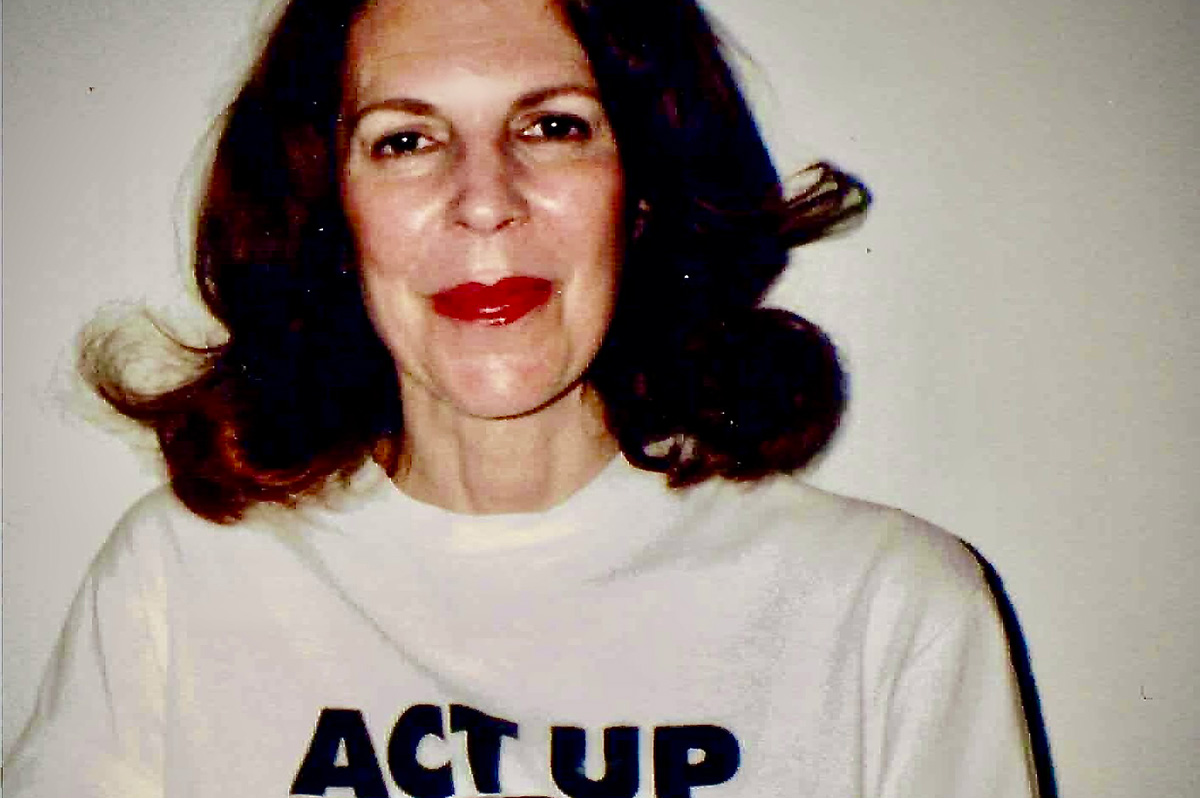
Nanette Kazaoka, a well-known figure in the fight for HIV/AIDS awareness and the rights of marginalized communities, passed away on Oct. 2 at her home in New York City. She was 83. The cause of death was complications from vascular dementia and Alzheimer’s disease, according to a statement from her daughter Kelly Kochendorfer.
Kazaoka was an advocate for justice, particularly in the early days of the AIDS crisis, when she became a member of the AIDS Coalition to Unleash Power, or ACT-Up. She is perhaps best remembered for her participation in a 2004 protest in front of Madison Square Garden during the Republican National Convention, when she and 11 fellow activists staged a dramatic naked demonstration, demanding debt cancellation for impoverished countries, according to a statement from the family.
“Bush, Stop AIDS. Drop the Debt Now!” they chanted, with slogans stenciled in black paint on their bodies. The bold protest drew national attention and underscored the urgency of global debt relief as a key element in the fight against AIDS.
She was born Nanette Natalina Bottinelli on June 12, 1941, in New York City. Her father, Angelo, worked as a waiter at the St. Regis Hotel, while her mother, Betty McComb, was a part-time burlesque dancer.
She married her first husband, Fred Kochendorfer, in 1963, and they had two children together, Kim Skrobe and Kelly, both of whom survive her.
Kazaoka’s journey to Fire Island marked a transformative period in her life. Kochendorfer wanted to live there, and so they began renting in 1967. Kazaoka then made a bold decision that would shape her future: She left her husband for another man and began living on Fire Island in 1968-1969, with the children attending school in Ocean Beach, according to the family’s statement.
This period coincided with the early days of the gay rights movement, as Fire Island was emerging as a hub for LGBTQ culture. Her experiences during these years contributed to the strong sense of activism and solidarity that would later define her role in ACT-UP and the broader fight for LGBTQ rights.
Kazaoka’s second husband, Katsushiga “Kats” Kazaoka, a Japanese-American psychologist who had been interred during World War II, died of cancer in 1984, pushing her to enter the workforce as a receptionist while studying occupational therapy at Downstate Medical Center. By 1990, she had earned her degree and sought work with AIDS patients.
In 1988, a close friend introduced her to ACT-UP, sparking the start of her full-time dedication to AIDS activism, the family said. Kazaoka became known for her passionate, unrelenting activism, whether protesting at City Hall or challenging anti-LGBTQ policies at St. Luke’s Hospital.
Kazaoka’s activism spanned 35 years, making her a beloved and respected figure within ACT-UP and beyond, the family noted. She was featured in Sarah Schulman’s “Let the Record Show: A Political History of ACT-Up New York, 1987-1993” as well as “Act-Up Oral History, No. 162,” a digital history. She was the cover photo of “Fag Hags, Divas and Moms: The Legacy of Straight Women in the AIDS Community,” and was included in The New York Times T Living Magazine story, “LEGENDS PIONEERS AND SURVIVORS.
Her dedication to science continued even after her passing: She donated her brain to the Mount Sinai NIH Brain and Tissue Repository for research to advance the understanding of the human brain health and disease to help end dementia, the family said.
Along with her daughters, Kazaoka is survived by her son-in-law John Skrobe, granddaughter Stella Skrobe and daughter-in-law Christine Arax, all of New York. She and her third husband, Paul Haskell, divorced in 2000.
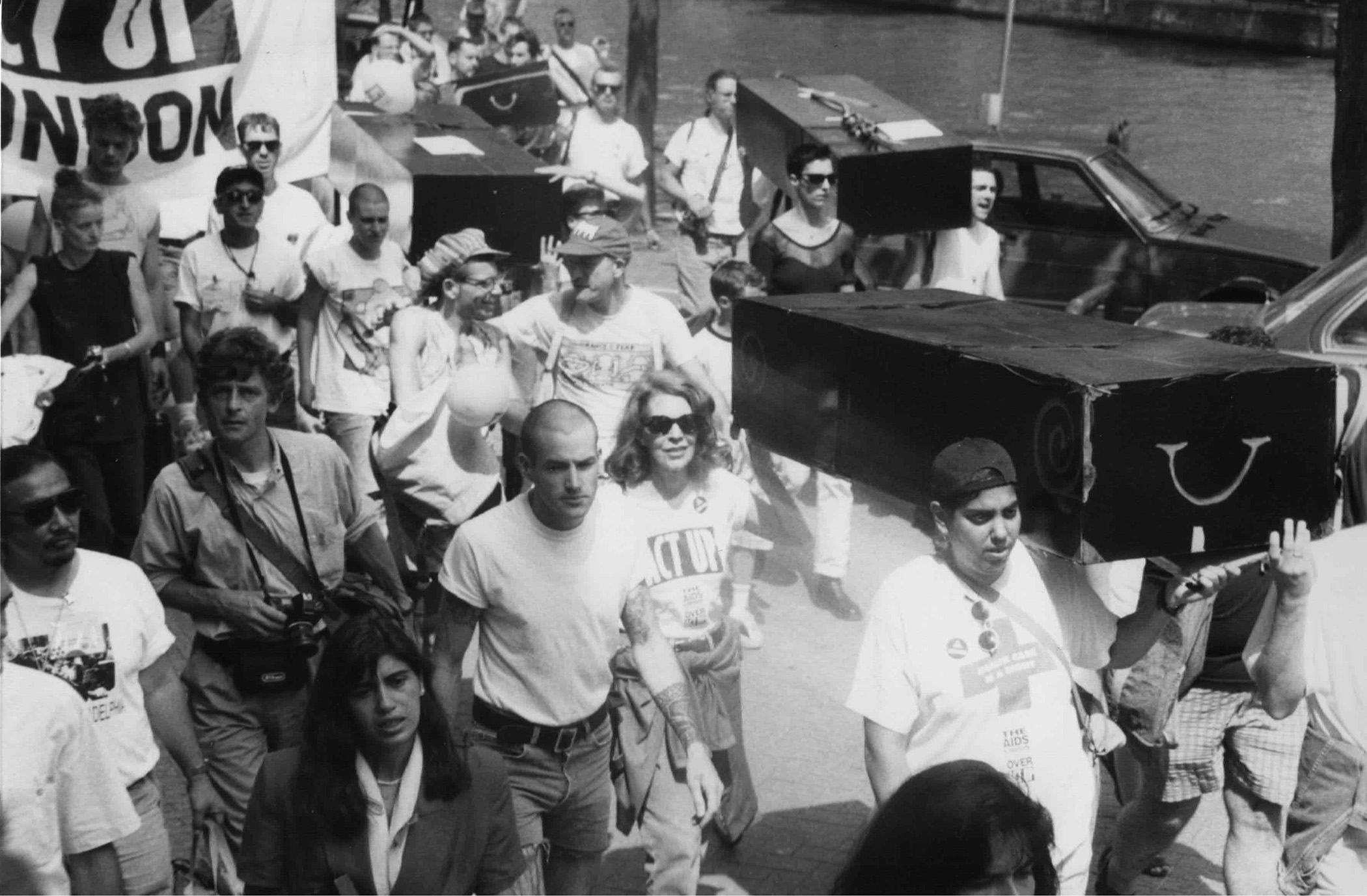
Local
D.C. LGBTQ rights advocate Jeri Hughes dies at 73
‘Force of nature’ credited with pro-trans policy at city jail
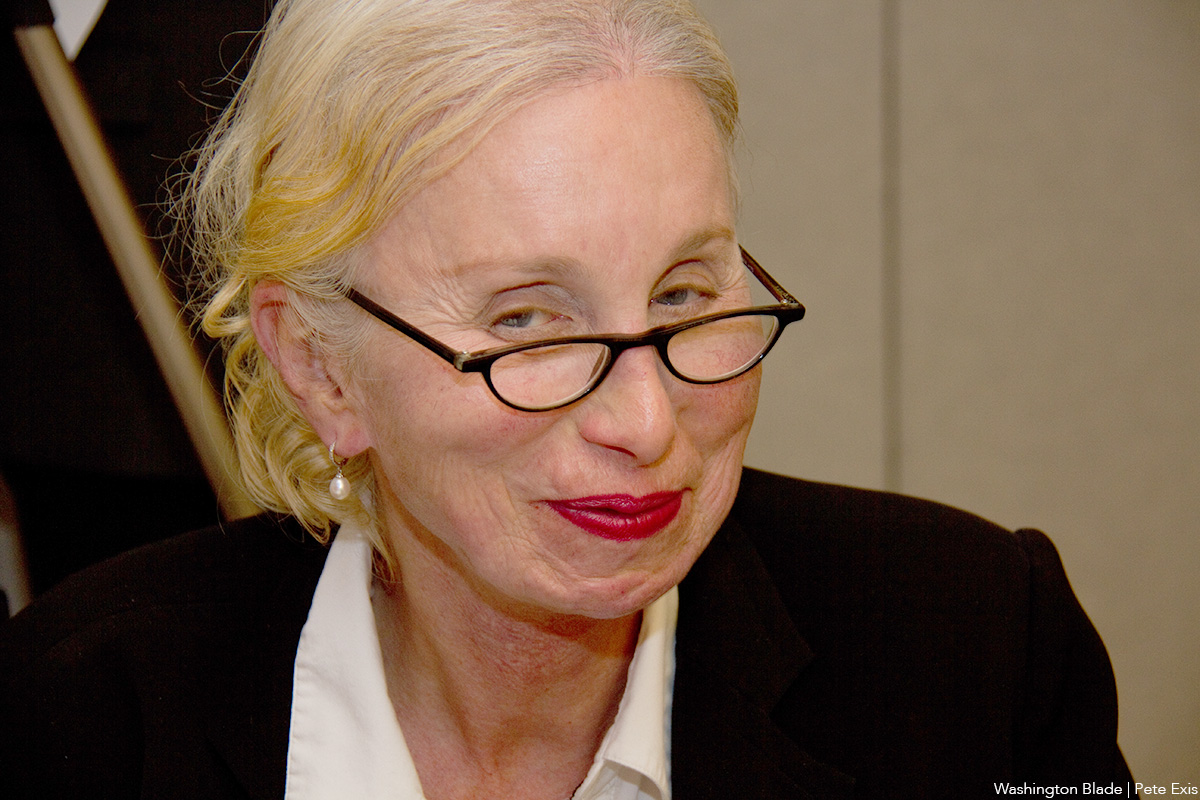
Jeri Hughes, a longtime D.C. transgender rights advocate who has worked closely with activists in support of the local LGBTQ community, died March 18 at her home after a seven-year battle with lung cancer. She was 73.
Hughes, who has worked for the past 11 years at the D.C. Department of Employment Services, most recently as a Workforce Development Specialist, became involved in local LGBTQ rights and transgender rights endeavors since she moved to D.C. around 2005.
Among other endeavors, Hughes, along with D.C. transgender rights advocate Earline Budd, has served for more than a decade on the D.C. Department of Corrections’ Transgender Housing and Transgender Advisory committees.
Budd this week said Hughes played an important role in ensuring that Department of Corrections officials continue to follow a 2009 policy of allowing transgender inmates to choose whether to be placed in the men’s or the women’s housing units at the D.C. jail.
“In her toughness and determination, Jeri was a force of nature,” said Rick Rosendall, former president of the D.C. Gay and Lesbian Activists Alliance. “She pressed the D.C. Department of Corrections for more humane and respectful treatment of transgender inmates,” Rosendall said.
“She pressed the D.C. government to set an example by hiring more trans people,” according to Rosendall, who added that Hughes interacted with D.C. police officials, including former D.C. Police Chief Peter Newsham, to push for respectful treatment of trans people by the police.
Hughes’s LinkedIn page shows that prior to working at the D.C. Department of Employment Services she served as housing coordinator for a local social services organization called T.H.E. Inc., where, among other things, she “monitored and mentored a diverse population of LGBT youth.”
Her LinkedIn page shows she also worked from June 2009 to May 2010 as an administrative assistant at the D.C. Anacostia Watershed Society.
Hughes’s brother, Lou Hughes, who said the Hughes family is originally from Ohio, told the Washington Blade Jeri Hughes served in the U.S. Navy after high school as a torpedo operator in a submarine in the South Pacific. He said a short time later Jeri Hughes moved to New York City, where she operated a company that provided commercial laundry service to restaurants and hospitals.
Lou Hughes said his sister Jeri moved to D.C. around 2005 and initially lived with him and his wife in a basement apartment in their house before moving to her own apartment in Northwest D.C. where she remained until her passing.
He said it was around 2005 that his sister informed her family that she planned to transition as a transgender woman at the age of 54. “And our family fully supported her decision, helped her finance the various surgeries,” Lou Hughes said. “And once she went through the transition it was like she was fully reborn.”
“And that’s why all these negative comments about transgender people right now – it’s very hurtful to our family because she was really the classic transgender person who was really simply born in the wrong body and gave our entire family a real sensitivity and understanding of what that meant,” Lou Hughes said.
Denise Leclair, one of Jeri Hughes’s closest friends and former roommate, said among Jeri Hughes’s many interests was boating. Leclair said Hughes persuaded her to join Hughes in purchasing a 45-foot sailboat in 2019, shortly after Hughes was diagnosed with lung cancer.
“We spent the next two months getting it fixed up and we started sailing,” Leclair recalls. “And we did quite a bit of sailing, so she really put her heart and soul into restoring this boat.”
Leclair said the boat was docked in a harbor in Deale, Md., just south of Annapolis. She said up until a few months ago, after her cancer prevented her from working full-time, Hughes spent most of her time living on the boat until her illness forced her to return to her D.C. apartment.
“My Dearest Sister Jeri, born April 30, 1951, left our restless Earth in the early morning of March 18, 2025, succumbing to the lung cancer which she battled against so bravely for seven years,” Lou Hughes says in a statement. “As we all know, Jeri was a person of high intellect, incredible energy and fearless in the face of adversity,” her brother wrote.
“Whether through acts of quiet charity, tireless advocacy, or simply offering a listening ear, Jeri made it a mission to uplift, support, and care for every person she encountered,” his statement says. “Her life was a testament to empathy in action, leaving a lasting legacy of love, hope, and selflessness that will continue to inspire all who knew her.”
In addition to her many friends and colleagues in D.C., Jeri Hughes is survived by her brother, Lou Hughes; sister-In-law Candice Hughes; daughter, Casey Martin; son-in-law Wally Martin; grandson Liam Martin; granddaughter, Mirella Martin; niece, Brittany Hughes; and nephew Klaus Meierdiercks.
A memorial service and celebration of life for Jeri Hughes is scheduled to be held May 10 at D.C.’s Metropolitan Community Church at 1 p.m., according to Earline Budd.
Obituary
Longtime D.C. librarian, LGBTQ rights advocate Turner Freeman dies at 64
‘Voracious reader’ pushed for inclusive programming at DCPL
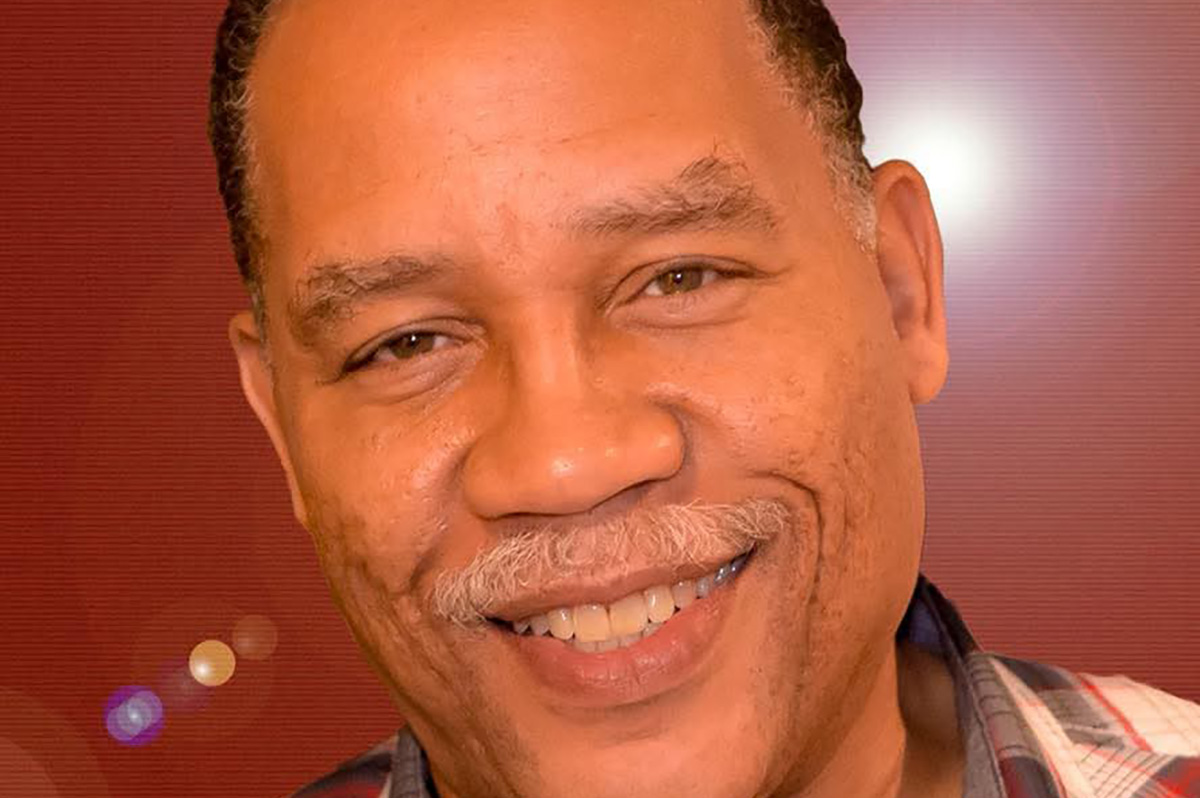
Sheldon ‘Turner’ Freeman, a gay librarian who worked for 39 years at the D.C. Public Library system and is credited with initiating a Black History Month film series and LGBTQ inclusive programming at the library system, died Dec. 23, at his home in Steelton, Pa. He was 64.
The D.C.-based LGBTQ advocacy and event planning group Team Rayceen Productions, which has held events at D.C.’s main Martin Luther King Library branch with support from Freeman, said the cause of death was a heart attack.
A write-up prepared by Freeman’s family members and published by Major H. Windfield Funeral Home in Steelton, says Freeman’s passing came just over a year after he retired from his position as librarian in November 2023 and moved back to his hometown of Steelton.
“Turner was known as a brilliant, proud Black man, who loved life and lived it to the fullest,” the write-up says. “He was a voracious reader and a music aficionado,” the write-up continues, adding that his other passions included dancing, Black history, collecting Black art, books, music and movies, “and watching his Eagles, Lakers and the Ohio State Buckeyes.”
It says he was a 1978 graduate of Steelton-Highspire High School and earned his bachelor’s degree in communications from Shippensburg University in Pennsylvania. He earned his master’s degree in Library Science from the University of the District of Columbia, according to the write-up.
A statement from the D.C. Public Library system to Team Rayceen Productions says Turner’s title at the time of his retirement was Adult Services Librarian.
“As an avid film buff, Turner was one of the first staff members of DCPL’s audiovisual department in the 1980s, now a city-wide collection of DVDs and other media as well as a plethora of online streaming resources,” the statement says.
“His weekly movie screenings have been running for more than two decades and are a beloved staple of MLK Library programming that has carried on past his retirement,” according to the statement. “His Black History Month film series is a particularly beloved annual event.”
The statement adds that Freeman’s voice was frequently heard on the MLK Library’s public address system and he “literally became ‘the voice’ of MLK Library’s 50th anniversary celebration, recording audio narration for library programming and citywide promotions.”
The Team Rayceen Productions statement says Freeman was a co-founder of a group called Book Reading Uplifts His Spirit, known as BRUHS, which focused on issues of interest to Black gay and bisexual men. Some of the group’s events, which were held at the MLK Library, included talks by authors, film screenings, and reading of plays.
The statement notes that in 2021, Freeman moderated an online Facebook discussion with James Earl Hardy, the author of the B-Boy Blues book series, a collection of six novels that tell the stories of Black gay men. It also points out that Freeman was on the committee that organized D.C.’s first Black Pride celebration.
A statement sent by D.C. Mayor Muriel Bowser to the Freeman family expresses her condolences over his passing and points to his numerous accomplishments as a librarian and community advocate.
“He was a caring friend and colleague whose impactful legacy, vibrancy, and kindness leaves behind an indelible mark on the hearts of many,” the mayor says in her message. “Turner was a role model, mentor, sports fan, and unwavering confidant, but above all there was no role more precious to him than that of a family man,” Bowser wrote.
“Turner’s love for his family was unparalleled, and his presence brought immense joy to his loved ones and to all those who knew him.”
A celebration of life for Freeman was held Jan. 4, at the Chapel of the Major H. Winfield Funeral Home in Steelton, Pa.
The funeral home write-up says Freeman was predeceased by his parents, Bucky and Cookie Freeman, and is survived by his son, Freeman Dane Swan; his sisters Stephanie Freeman, Stacey Freeman-McKamey, and Sage Freeman; and many loving aunts, uncles, nieces, nephews and friends.
-

 Opinions5 days ago
Opinions5 days agoIt’s time for new leadership on the Maryland LGBTQIA+ Commission
-

 The White House4 days ago
The White House4 days agoWhite House does not ‘respond’ to reporters’ requests with pronouns included
-

 Arts & Entertainment5 days ago
Arts & Entertainment5 days ago‘Gay is Good’ Pride Pils Can Celebrates Frank Kameny’s 100th Birthday for WorldPride in D.C.
-

 Sponsored5 days ago
Sponsored5 days agoTHC Drinks: What You Should Know About Cannabis Beverages












